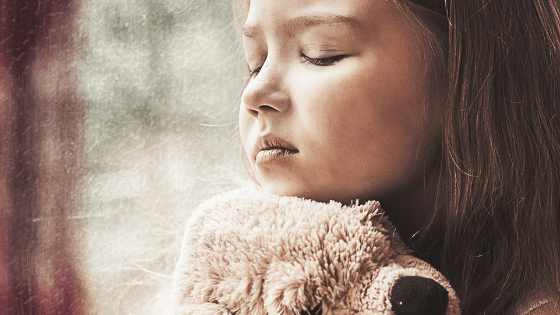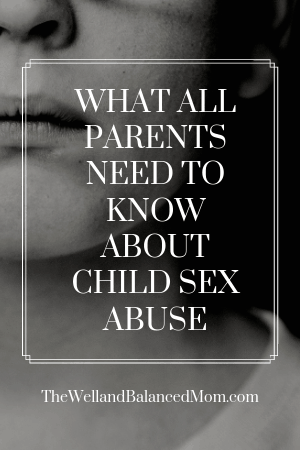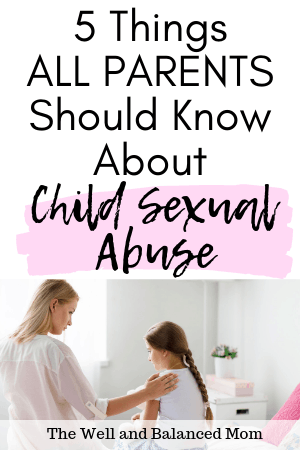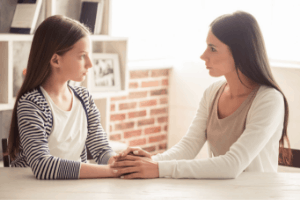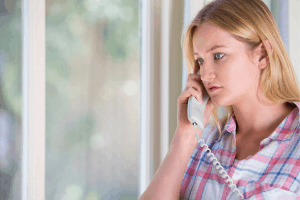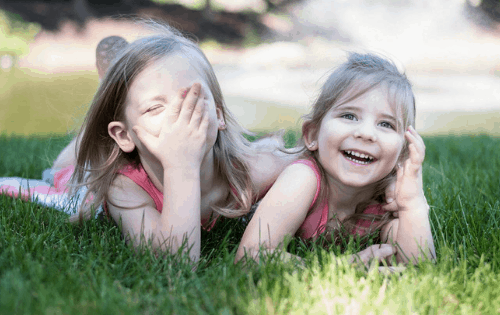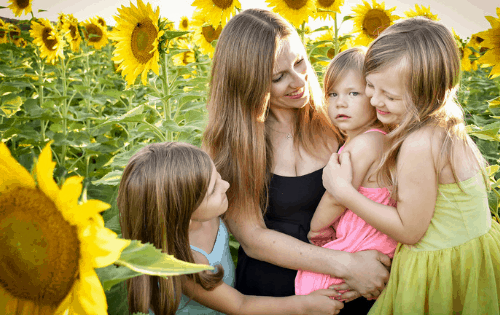As I sit in my home about to write this post about child sexual abuse, I’m listening to my three little girls playing. They’re dressed like cape-wearing princesses and are prancing around waving stuffed animals and foam swords.
I love watching their imaginations at work. Their world is full of creativity and innocence.
It’s hard to imagine that we live in a world where innocent children are so often abused, but unfortunately, we do. Most of us can’t comprehend how anyone could want to hurt a child. I know I can’t.
Recently, I started learning more about child sexual abuse. Although I’ve never written on this subject, I feel called to be a voice in this area.
I believe that we all have an obligation to be advocates for children. After all, children can’t protect themselves. They depend on us for that. So, we all have a responsibility to learn the facts about child abuse and start doing what we can to save our kids.
The Harsh Reality About Child Sexual Abuse
As a parent, honestly, I don’t even like to think about the possibility of my children being abused. I want to believe that everyone is like me and honors my children’s innocence. I want to think that child sexual abuse is something that happens in other places, far away from my town and neighborhood.
Child sexual abuse is such a dreadful subject that many of us (including me for years) choose to look the other way and not deal with the harsh reality that this is all around us.
Turn on your local news almost any night of the week and you’ll see stories of minors being sexually abused. It doesn’t matter where you live, what religion is prevalent in your area, or what political party your town embraces.
Child predators are there, and child sex abuse is likely already occurring. It might hurt us to think about that, but Flannery O’Connor once wrote that “The truth does not change according to our ability to stomach it.”
If we ignore the facts about the prevalence of child sexual abuse, we put our children at more risk. We need to face the harsh reality head-on if we want to create positive change.
This post contains affiliate links. If you make a purchase, I receive a small commission at no extra cost to you. You can read my full disclaimer here.
Here are some facts you need to know about child sexual abuse:
1. Girls and boys are sexually abused.
Maybe you think you don’t need to worry about this because you only have boys. It’s true that young girls are more likely to be abused than boys, but boys are still at high risk.
In fact, 1 in 6 boys will be sexually abused by the age of 18 (the statistic for girls is 1 in 4). So, it doesn’t matter what gender your child is, we all need to be on high alert.
2. Abuse occurs most often by someone we know and trust.
When I think about pedophiles, I have an image in my mind that is nothing like anyone I know. But the truth is that most children are abused by people who know them.
Sadly, as much as we want to assume the best of people, we can’t assume that all the people we know are safe to have around our kids. Those kinds of naïve assumptions put our children at risk and cause parents to struggle with regret after abuse occurs.
3. Abuse often occurs in places that we feel safest.
Are there places where you feel like you can let your guard down? Many of us like to think our kids are safe at church, but recent news stories easily shatter that perception. Kids are frequently abused in churches, at friends’ houses, or in our own homes by people who are trusted by the family.
4. Adult men are not the only perpetrators.
When I first started learning about child sexual abuse, I thought that only adult men were offenders. It’s true that most abusers are men, but there are female abusers as well. And did you know that juveniles are the offenders in up to 40% of child sexual abuse cases?
That means, we need to be careful even about the other children that our kids are exposed to. Child offenders are not evil (they are still children after all) and they need help and support, but we should protect our kids from them, nonetheless.
You can find more statistics about child sexual abuse here.
5. The consequences of child sex abuse are lifelong.
Child sexual abuse is not something that happens once and is easily forgotten. Sexual abuse is traumatic and scarring.
Victims are more likely than non-victims to experience mental health problems, substance abuse, eating disorders, obesity, and other physical health problems like diabetes, cancer, heart problems, and stroke. And they are at a higher risk of being sexually abused again later in life.
So, What Can We Do?
Learning about the prevalence of child sexual abuse in our world is important, but it can also make you feel helpless. The good news is that we aren’t powerless in the fight against this evil. I don’t believe in living in fear and allowing it to cripple us.
There are risks to leaving the house each day, but we all do it anyway, right? If we use safe practices, educate ourselves, and use our best judgment, we can protect our children and significantly reduce their risk of being sexually abused.
Start by talking to your kids.
This one suggestion could fill a book. Here are some important tips that will help you get a conversation started, but I recommend looking more into how to talk to your kids about this subject.
Have these conversations early (around 3-4 years) and often.
- Teach your kids about safe touch and bad touch.
- Teach the anatomically correct names of body parts.
- Instruct them to tell you if any adult tries to “keep a secret” with them.
- Question your kids about the time they spend with others. Find out what they did and what was talked about. Pay attention to their responses and note if anything seems unusual.
For more suggestions on how to talk to your kids of all ages about abuse, check out the site TheMamaBearEffect.org.
There are also books you can get to read with younger kids, such as My Body is Special and Private or I Said No! A Kid-to-kid Guide to Keeping Private Parts Private.
Educate yourself on grooming and the warning signs of abuse.
Often, before attempting to abuse a child, a predator will “groom” the child and/or the child’s family. This process includes befriending the child and family members in an attempt to get your guard down.
If you feel like someone is acting overly-friendly towards your child or if someone just gives you a bad gut feeling, play it safe.
It’s also important to recognize the warning signs of a child who has been sexually abused. Some of those signs include:
- Signs of trauma in the genital area, such as bleeding or bruising. Bloody bed sheets can also be a sign.
- Sudden bedwetting.
- Seeming nervous to be left alone with someone or suddenly not wanting to part with primary caregivers.
- Not wanting to take clothes off to change or bathe.
- Suddenly talking about sexual topics.
- Nightmares or fear of being alone at night.
- Excessive worry or fearfulness.
You can find more info here: Warning Signs of Child Abuse
Learn the policies of your children’s organizations.
Don’t allow your kids to be part of an organization where an adult is alone with your child without supervision. I realize that this might seem overprotective to some, but I’m willing to lean on the side of overprotection if it means saving my kids from trauma.
If you are leaving your kids in a place where you won’t be present, it’s crucial to know the policies that are in place.
At my church, you can’t drop your kids off in the childcare rooms until at least two adults are present. Each room also has a window, so it’s possible to see what’s happening at all times. A major way to fight abuse is to minimize the opportunity for it to happen. These types of policies and procedures do just that.
*If you’re in Lancaster, PA: Join a “Safe Church” or encourage your church to become a “safe church.” The Samaritan Safe Church/Safe Places program is based in Lancaster, PA, and their mission is to fight child sexual abuse by equipping adults with the tools and knowledge to keep children safe.
Church leaders who go through the “Safe Church” program, also learn how to deal with many other tough issues such as how to help congregants who have been victims of sexual abuse, what to do if abuse is suspected within the church, and how to create plans for when a sexual offender starts attending.
Find out more about the Samaritan Safe Church/Safe Places program here.
Speak up when you see anything suspicious.
As adults, we are the ones who can help create change. We need to be advocates and fierce protectors of our own children, as well as for other children in our communities.
It’s disturbing to hear news reports of adults who have allowed children to be abused by their inaction. We all want to believe that we could never do that— that we could never sit idly by and allow a child to be harmed.
While I think that most of us would never knowingly do this, some of us may be doing it unknowingly by keeping silent about things we see.
Our reasons for staying silent may be that we “don’t want to hurt anyone’s feelings,” “we might be wrong,” “we don’t have proof of any wrongdoing,” or we are simply afraid. I’m not suggesting that we go around pointing unjustified fingers, but we should speak up if we see even a potentially unsafe situation.
Don’t let fear keep you from speaking up. You may be wrong, but when it comes to child sexual abuse, safe is always better than sorry. If you were a child who was being hurt by an adult in your life, you would want someone to save you. Nothing else should be a priority before that.
I hope and pray that we become a society that puts our children’s safety above organizations, above reputations, and above power.
Our children deserve that from us.
We deserve that from us.
“The only thing necessary for the triumph of evil is for good men (or women) to do nothing.”
-Edmund Burke (parentheses added)
“The light shines in the darkness, and the darkness has not overcome it.” -John 1:5
This article was also posted on SCCLanc.org.
